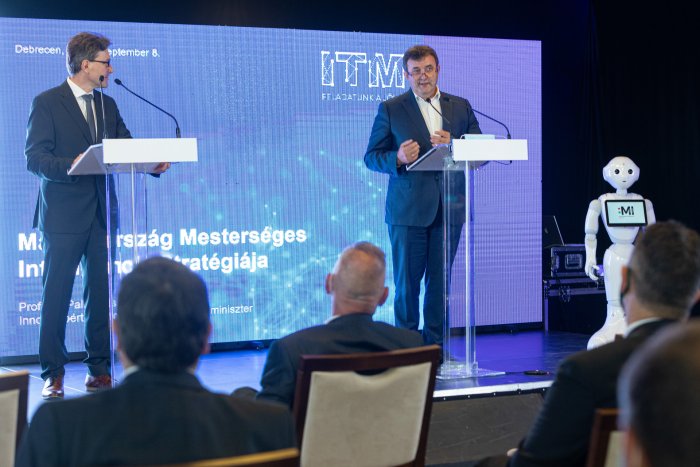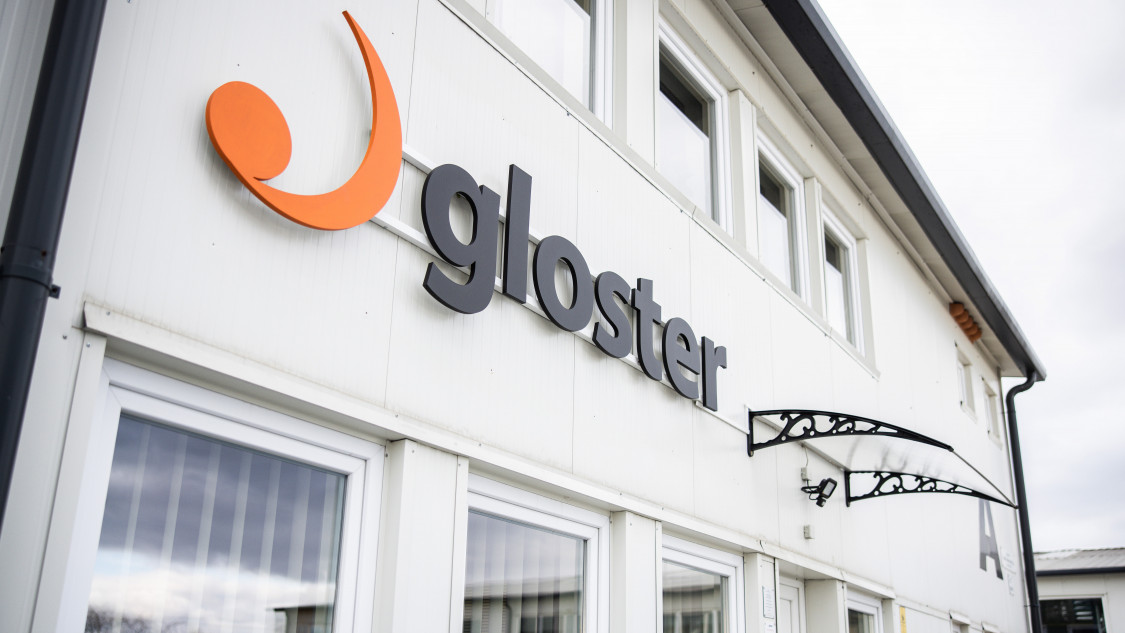Growth Curve Thru 2030 to be Defined by Newly Revealed AI Strategy

Zoltán Iró, Ministry of Innovation and Technology
Following collaboration between the Ministry for Innovation and Technology and the Artificial Intelligence Coalition, a 250-member strong stakeholder forum run by the Digital Success Program, Hungary’s AI Strategy has been now revealed. The aim is to set the data economy in motion, with large-scale educational programs and widespread social awareness to boost growth in the upcoming decade.
AI Coalition President Roland Jakab (left) and Minister for Innovation and Technology László Palkovics. Photo by Zoltán Iró, Ministry of Innovation and Technology
“After one and a half years of work by stakeholders representing industry, academia and the administration, the government has adopted Hungary’s AI Strategy, thanks to which we can emerge as winners from the technology disruptions that alter all segments of our lives,” said Minister for Innovation and Technology László Palkovics at the press conference revealing the plans.
Primary objectives include that at least one million Hungarian citizens find higher value-added jobs within the next 10 years, and GDP and the SME efficiency should be boosted by 15% and 26%, respectively.
To achieve that, the data economy needs to be set in motion, for which the National Data Capital Agency (NAVÜ) and Neumann Nonprofit Kft. will set up the institutional framework and coordinate strategic management.
To lay the groundwork for data-driven governance, a data analysis competence center will be established via a cooperation agreement between the University of Debrecen and NAVÜ that has been commissioned to analyze public records.
For the sake of supporting R&D, as well as the widespread adoption of best practice, the national High-Performance Computing (HPC) infrastructure and ecosystem will continue to be upgraded, an essential factor for high level innovation activities.
High Speed
Accordingly, an HPC facility of five petaflops should be up and running in Debrecen by 2022 (a petaflop is a measure of a computerʼs processing speed and is the equivalent of quadrillion (thousand trillion) floating point operations per second (FLOPS) or 1,000 teraflops).
“Simultaneously, we are setting up data marketplaces on the new web page of the local AI ecosystem, ai-hungary.com so that stakeholders of the economy can use anonymized, not person-related public records for their own purposes and they can trade data among one another. This way secondary data use can become a matter based on an informed decision in both the private and the public sector,” added Palkovics.
A crucial precondition to boost SME efficiency is to ensure that a for-profit approach is applied in ever more research. Hence the establishment of the AI National Lab headed by the Institute for Science and Control (SZTAKI) that is meant to mainly facilitate applied research activities.
So-called “use-cases” (a methodology used in system analysis to identify, clarify and organize system requirements) will be incentivized by the AI Innovation Center.
Moonshot Projects
In another major pillar of the AI Strategy, so-called transformative programs are foreseen. These are moonshot projects that gear up the economy and society for tech disruption.
They include autonomous driving, customer service automation, climate-driven agriculture, energy systems based on renewables, personal assistants in healthcare, and a “data wallet” that takes the rights of citizens to self-management over their own records to a whole new level.
From the industrial perspective, manufacturing, healthcare, agriculture and transportation/logistics may be the segments where Hungary has the best shot at a winning edge in the global AI race.
Accordingly, those sectors are now on the government’s official short list for areas where the state could gain the best results in allocating research capacities up till 2030.
The strategy will never be successful if not connected to a large-scale awareness campaign. As step one, web portal ai-hungary.com has been launched as a single point to gather all the information related to AI transformation.
That is just the prelude to a nationwide communications effort, though, that aims to educate citizens and the corporate world about the importance of AI adoption.
The package of measures, including related projects and the institutional framework, is expected to cost HUF 170 billion through to 2030. Additional expenses are bound to be incurred by companies to adopt or develop use-cases.
On the way to an AI-ready Workforce
Hungary’s AI Strategy puts a large emphasis on education as a cornerstone to create an AI-ready workforce. Consequently, an AI Academy has been launched that gathers tech-related learning opportunities and serves as a knowledge hub.
As AI Coalition President Roland Jakab tells the Budapest Business Journal, not only employees but also employers need to be prepared for the AI transformation, and to embrace new working methods and use-cases.
“Our flagship initiative is the AI Challenge, under which we aim at making up to one million Hungarians familiar with AI and getting at least one 100,000 people to complete a basic course on the topic. Apart from that, we will launch a number of courses at the secondary and higher education level. Offering relevant adult training programs that are meant to help reskill the workforce is also on the agenda,” highlights Jakab.
An official Hungarian AI syllabus should be available by the end of this year, whilst select foreign courses are recommended on the AI Hungary website. This way individuals and corporates alike can have a single source of information about reskilling, and companies can also learn first-hand about the latest solutions to optimize their working processes.
And what does the future hold? If things go as planned, AI-driven personalized learning paths should guide us all to enjoy ever more satisfying careers sooner than you think.
SUPPORT THE BUDAPEST BUSINESS JOURNAL
Producing journalism that is worthy of the name is a costly business. For 27 years, the publishers, editors and reporters of the Budapest Business Journal have striven to bring you business news that works, information that you can trust, that is factual, accurate and presented without fear or favor.
Newspaper organizations across the globe have struggled to find a business model that allows them to continue to excel, without compromising their ability to perform. Most recently, some have experimented with the idea of involving their most important stakeholders, their readers.
We would like to offer that same opportunity to our readers. We would like to invite you to help us deliver the quality business journalism you require. Hit our Support the BBJ button and you can choose the how much and how often you send us your contributions.








